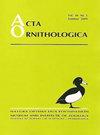白尾海雕的亲代分析:巢地的脱落羽毛是亲代DNA的可靠来源吗?
IF 1.3
4区 生物学
Q3 ORNITHOLOGY
引用次数: 3
摘要
摘要现有的大型猛禽亲子关系分析大多使用自然脱落的羽毛作为DNA来源。有证据表明,鹰的巢穴有时会被同种动物造访。这些访客是否涉及额外的亲子关系?5月,主要在2010-2016年期间,在捷克共和国的13个巢穴采集了400多个雏鸟和成年白尾鹰的羽毛样本。样本在六个微卫星基因座上进行了基因分型,以确定每个巢位出现的个体的身份和数量,并测试遗传一夫一妻制。最终,从巢穴下方发现的蜕皮羽毛中鉴定出110种可能的亲本的独特基因型,并与86种后代基因型一起用于亲子关系分析。有趣的是,在11个巢的64次检查中,有三分之一的巢从脱落的羽毛中取样了两种以上的成年基因型,但巢的成功与否不受基因型数量的影响。没有记录到额外配对的亲子关系。结果表明,在一个繁殖季节,白尾鹰的巢穴下方可以发现除父母对以外的个体的羽毛,即使在七年的研究中,单个巢穴中父母的身份也可能发生变化,这与白尾鹰预期的寿命、终身一夫一妻制和假定的领地性不一致。我们不建议根据在eyries下面发现的羽毛对筑巢对进行DNA采样,因为在使用这种方法的情况下,只有58%的病例在适当的年份记录到了最有可能的亲本。本文章由计算机程序翻译,如有差异,请以英文原文为准。
Parentage Analysis in the White-Tailed Eagle Haliaeetus albicilla: Are Moulted Feathers from Nest Sites a Reliable Source of Parental DNA?
Abstract. Existing parentage analyses of large raptors have mostly used naturally shed feathers as a source of DNA. There is evidence that eagle nests are sometimes visited by conspecifics. Are these visitors involved in extra pair-paternity? More than 400 feather samples of nestlings and full-grown White-tailed Eagles were obtained in May at 13 nest sites in the Czech Republic, mainly during the years 2010–2016. The samples were genotyped at six microsatellite loci to determine the identity and number of individuals occurring at each nest site and to test genetic monogamy. In the end, 110 unique genotypes of possible parents were identified from moulted feathers found below nests and were used in a parentage analysis together with 86 offspring genotypes. Interestingly, more than two adult genotypes were sampled from shed feathers in one-third of 64 checks of 11 nests, but nest success was not affected by the number of genotypes. No case of extra-pair paternity was recorded. The results showed that feathers of individuals other than the parent pair can be found below nests of White-tailed Eagles during a single breeding season, and the identity of parents at individual nests can change even during seven years of study, which is inconsistent with the expected longevity, lifelong monogamy and presumed territoriality of White-tailed Eagles. We cannot recommend DNA sampling of nesting pairs on the basis of feathers found below eyries, because the most likely parent was recorded in the appropriate year only in 58% of cases with this method.
求助全文
通过发布文献求助,成功后即可免费获取论文全文。
去求助
来源期刊

Acta Ornithologica
生物-鸟类学
CiteScore
2.10
自引率
0.00%
发文量
14
审稿时长
>12 weeks
期刊介绍:
Publishes scientific papers (original research reports, reviews, short notes, etc.) and announcements from all fields of ornithology. All manuscripts are peer-reviewed.
Established in 1933 as Acta Ornithologica Musei Zoologici Polonici, since 1953 continued under the present title.
Published twice a year by the Natura Optima Dux Foundation under the auspices of the Museum and Institute of Zoology, Polish Academy of Sciences.
 求助内容:
求助内容: 应助结果提醒方式:
应助结果提醒方式:


